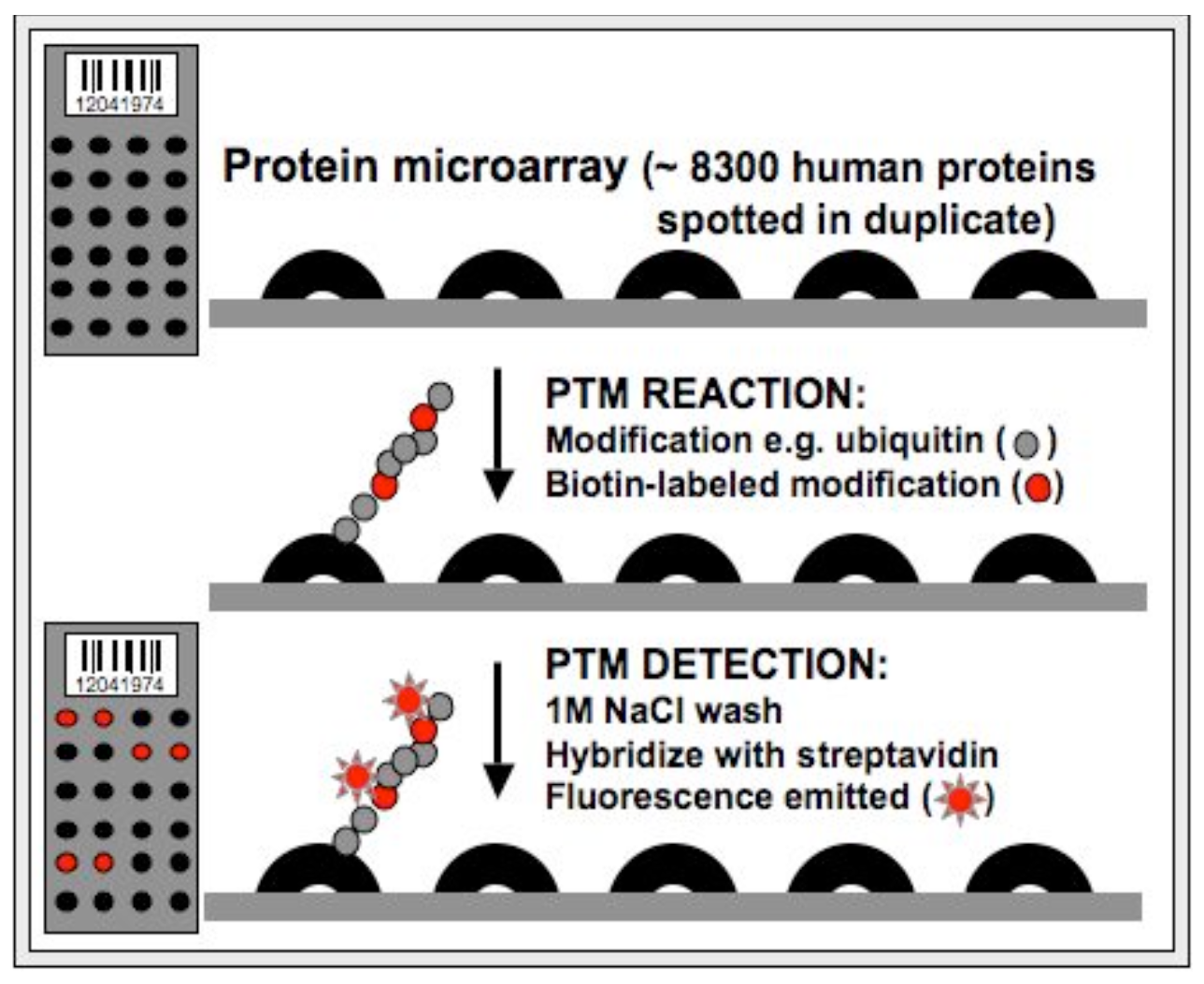Protein Microarray-Based PTM Analysis Service
Protein Microarray-Based PTM Analysis Service is a high-throughput post-translational modification (PTM) analysis service based on protein microarray technology. It supports parallel detection of various modification types (e.g., phosphorylation, acetylation, methylation, ubiquitination) and is suitable for comparative modification profiling across different treatment conditions, sample types, or clinical cohorts.
PTMs are key regulatory mechanisms that control protein function, localization, and interactions. They include a wide range of modification types such as phosphorylation, acetylation, ubiquitination, and methylation. Protein microarray technology, as a high-throughput and parallelized analytical platform, enables the simultaneous detection of modification states across thousands of proteins in a single experiment, providing a powerful tool for PTM research. This technique involves immobilizing a large number of functional proteins or modification-specific antibodies onto a solid-phase support (e.g., glass slides), which then specifically bind to target molecules in the sample. Detection antibodies or probes with fluorescent or chemiluminescent labels are used to visualize and quantify the binding signals, providing information on protein modifications. The technology offers advantages such as high throughput, high sensitivity, and minimal sample consumption, making it well-suited for large-scale PTM profiling.
MtoZ Biolabs provides Protein Microarray-Based PTM Analysis Service to systematically detect and analyze various PTMs in protein samples using modification-specific antibodies or probes. This service enables simultaneous detection of multiple PTM types, offering both qualitative and quantitative data. It helps researchers gain a comprehensive understanding of the dynamic changes and biological significance of protein modifications, supporting mechanistic studies and translational medicine research.
Analysis Workflow

del Rincón, Sonia V. et al. Plos One. 2010.
The main workflow of Protein Microarray-Based PTM Analysis Service is as follows:
1. Sample Preparation
Extract proteins from target cells or tissues, followed by concentration measurement and quality control.
2. Microarray Incubation
Incubate the sample with a pre-fabricated protein microarray chip to allow specific binding between modified proteins in the sample and capture probes on the chip.
3. Signal Detection
Add fluorescently or enzyme-labeled secondary antibodies, and use a scanner to capture signal intensity and generate imaging data.
4. Data Analysis
Perform background correction and normalization on the acquired signal data, and apply bioinformatics tools for statistical analysis and functional annotation.
5. Result Reporting
Deliver a comprehensive analysis report, including qualitative and quantitative information on modification sites and results of functional enrichment analysis.
Applications
Application Examples of Protein Microarray-Based PTM Analysis Service:
Dynamic Pathway Analysis
Rapidly assess changes in the modification status of key proteins across multiple signaling pathways.
Mechanism of Drug Action Studies
Compare PTM patterns before and after treatment to evaluate the drug’s impact on signal transduction or transcriptional regulation.
Disease Biomarker Discovery
Identify potential biomarkers by comparing PTM differences between disease and control groups.
Multi-Omics Integration
Integrate with transcriptomics, metabolomics, phosphoproteomics, and other datasets to construct multilayered regulatory networks.
Service Advantages
1. Advanced Analysis Platform: MtoZ Biolabs established an advanced Protein Microarray-Based PTM Analysis Service platform, guaranteeing reliable, fast, and highly accurate analysis service.
2. One-Time-Charge: Our pricing is transparent, no hidden fees or additional costs.
3. High-Data-Quality: Deep data coverage with strict data quality control. AI-powered bioinformatics platform integrates all Protein Microarray-Based PTM Analysis data, providing clients with a comprehensive data report.
4. High-Throughput Analysis: A single experiment can simultaneously detect multiple modification states across thousands of proteins, saving time and cost.
5. Low Sample Requirement: Requires only a small amount of sample, making it suitable for precious or limited specimens.
FAQ
Q. What Types of Post-Translational Modifications Can this Service Detect?
We can detect a wide range of common PTMs, including but not limited to phosphorylation, acetylation, methylation, ubiquitination, and glycosylation.
Q. Is the System Sensitive Enough to Detect Low-Abundance Modifications?
Yes. We utilize high-sensitivity fluorescence detection systems and optimized signal amplification protocols, enabling reliable detection of low-abundance modifications in various sample types, including cells, tissues, and clinical specimens (e.g., serum, FFPE samples).
Q. How is the Specificity and Accuracy of PTM Recognition Ensured with the Antibodies or Probes Used?
MtoZ Biolabs uses antibodies or modification-specific probes that have been validated for site specificity. Their performance is confirmed through multiple experimental approaches, such as point mutation analysis, modified peptide competition assays, and Western blotting. Additionally, positive/negative control spots and replicates are included in chip design to minimize cross-reactivity and false positives, ensuring the reliability of the results and their biological interpretability.
How to order?







